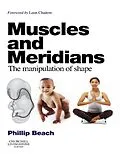Muscles and Meridians is a unique book that breaks new conceptual ground in the realm of human movement. Exploring the connection between evolutionary biology and Chinese meridians, the volume offers a novel and effective system of diagnosis and treatment of common musculoskeletal disorders. - Describes a new model of human movement - the Contractile Field model - Offers a rare and serious attempt to look at whole person movement patterns - akin to 'Anatomy Trains' but with a stronger link to vertebrate evolution and development - Suggests that much of our endemic back and leg pain is due to a loss of ease in postures that are 'archetypal' to mankind - Offers a profound new understanding of the world's oldest medical map, the Chinese meridian map
Autorentext
Graduated BCNO (now BCOM) 1983. Taught osteopathic technique BCNO 1986-2003, taught osteopathic rehabilitation at the BSO 1997-2003.
London School of Acupuncture and Traditional Chinese Medicine, 1986-1990
Keynote Lecture, 1st International Conference on Advances in Osteopathic Research, London 1999
Workshop, 4th Pan Pacific Medical Acupuncture Forum, Taupo, New Zealand, 2004
Private practice, Wellington, New Zealand 2004 -
Klappentext
Muscles and Meridians is a unique book that breaks new conceptual ground in the realm of human movement. Exploring the connection between evolutionary biology and Chinese meridians, the volume offers a novel and effective system of diagnosis and treatment of common musculoskeletal disorders.
- Describes a new model of human movement - the Contractile Field model
- Offers a rare and serious attempt to look at whole person movement patterns - akin to 'Anatomy Trains' but with a stronger link to vertebrate evolution and development
- Suggests that much of our endemic back and leg pain is due to a loss of ease in postures that are 'archetypal' to mankind
- Offers a profound new understanding of the world's oldest medical map, the Chinese meridian map
Inhalt
1. A wriggle in deep time
2. Embryological morphogenesis
3. Modelling movement
4. Lateral contractile field (L-CF)
5. Dorso/ventral contractile field (D/V-CF)
6. Helical contractile field (H-CF)
7. Limb contractile fields (Limb-CFs)
8. Radial contractile field (R-CF)
9. Chiralic contractile field (C-CF)
10. Fluid field (F-F)
11. Archetypal postures: a self-tuning mechanism
12. Decoding the Chinese meridial map
13. Manipulating shape
Abbreviations and glossary
